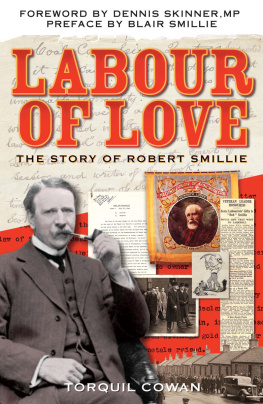PREFACE
OVER THE years, from a very early age, I had heard a few stories of the achievements of my great-grandfather Robert Smillie MP. In some ways I used to have a fascination with him and this constantly niggled away at the back of my mind. At a very early age, I was presented with a copy of his brief autobiography My Life for Labour, published in 1924 by Mills & Boon. I found the aged pages very difficult to read as the story was very factual and not what I was used to reading. Time and time again I tried to read it to the end but never achieved my goal. Factually, it was a wonderful resum of his life mentioning many famous characters such as Winston Churchill, Stanley Baldwin and David Lloyd George but to me as a young lad it was not an inspiring read.
Later in life I looked it out again and was at last fascinated with the life changes my forebear had helped make to the working practices in the UK. I felt it only right that I should find a way to retell his story in order for it to have universal interest, not just to those solely interested in the 20th-century history of the working classes.
Being a stronger persuader than a writer I used my abilities to engage my now friend and fellow Scot, writer Torquil Cowan, to take on this mammoth task, and I must say he has excelled in revealing the character of Robert Smillie. He has cleverly created a story within a story and set the main narrative within its time as a long-lost manuscript that comes to light some 70 years after the death of its writer, who is his fictitious grandfather, Robert James MacGregor. The combination of Smillies personal life and his political struggles brings together a story of almost unimaginable dedication to the cause of helping others.
This remarkable tale, about an equally remarkable man, will entertain, educate, shock and amuse the reader who enters a bygone world far removed from that of today. His struggle, together with other great working-class men, helped to improve the lives of millions throughout this historic period and should never be forgotten.
Labour of Love is my way of bringing back the memory of a man who had been one of the leading lights in the Labour Movement and trade union history; a man who had been a main mover in the setting up of the Scottish Miners Federation, the Scottish Trades Union Congress, The Miners Federation of Great Britain, the Labour Party and the Triple Alliance. Honoured in America and across Europe, founder of the National Council for Civil Liberties, a member of the Committee of Honour of Save the Children and a Member of Parliament.
My resolve to reveal this remarkable man drove me on and I went as far as undertaking considerable research through documentation and conversations with older members of my extended family. I was confident that I had all the information I needed to rewrite my great-grandfathers story and portray him as a man, not just a tireless worker on behalf of others. And that is where Torquil Cowan came in. Having cornered him at the creative writing group that he ran, I knew that I had found the ideal person to take on the monumental task of bringing Bob Smillie back to life.
Torquils achievement is now here for all to enjoy. When I first read it, I realised that I finally knew my great-grandfather at long last, a man who selflessly dedicated his life to the betterment of others. His life was full of struggle yet I know that he was uncomplaining about that. He gave so much of himself to everybody else, yet still lived a full, private life as this new book will reveal. Now when I hear the word hero, I think of only one man, my great-grandfather.
This book is dedicated to that very special man, Bob Smillie.
Blair Smillie
FOREWORD
ROBERT SMILLIE is one of the great names of the Labour Movement. At one time Id felt a debt of gratitude to him. Thanks to a scholarship endowed in his name, I was awarded a place at Ruskin College in 1959. For a variety of reasons, I didnt take up that place until 1967 when I spent my time writing essays on politics and industrial relations. Oh aye, and spending some time playing the All England Clubs favourite sport. Which is why, when Im asked about my student days, I always tell people that I went to Oxford to read tennis!
As one of ten children brought up in a Derbyshire mining community, you might imagine that I know exactly what life must have been like for Robert Smillie, his wife Ann and their nine children. Youll be thinking that their circumstances were like mine: big families living in similar environments, facing the same difficulties, that sort of thing. But let me tell you that the more Ive found out about Robert Smillies life and times, the more convinced Ive become that what he and his contemporaries faced was a lot tougher than my early life.
Yes, money was in relatively short supply when I was growing up and we had to work hard, learning from a very early age the value of it. But when Smillie was a young man, each day was a struggle for survival in a way in which those of us born later would find difficult to understand. And if life for people like me down the mines was tough enough, it was a damned sight easier than the mining life Smillie experienced. Reading about his time as a miner made me think and wonder it really did. Seventeen years old, employed as a hand pumper, trapped underground for twelve hours at a time, was bad enough; I can hardly imagine what the regular twenty-four-hour shifts no other humans in sight, only rats for company must have been like. I shudder to think about it.
However, its not Robert Smillie the miner who is the real focus of interest; its the Smillie who co-founded the Scottish Miners Federation, the Scottish Trades Union Congress and, alongside his great friend Keir Hardie, the Labour Party. The Smillie who became President of the Miners Federation of Great Britain and led it for nine taxing years which took in the first National Miners Strike and the formation of the Triple Alliance. Then there was Smillie the MP who crossed swords with Asquith, Churchill and Lloyd George among others. Finally, the man who founded what became known as the National Council for Civil Liberties and was a member of the Committee of Honour for Save the Children.
When I consider the roles he held and the achievements of his life, I can only conclude that many people have become renowned for much less. In part thats down to the way history is written. Also its due to the nature of the man. He worked tirelessly for what he saw as the righteous cause of the Labour Movement. Closely though Ive looked, I have found no trace of him doing anything for the sake of personal ambition. He even turned down government posts from Lloyd George and Ramsay MacDonald so that he could concentrate his efforts on behalf of the miners and working people everywhere. In my opinion, that is the key to the man. He did everything for the sake of other people, never for himself.
Time hasnt changed me much. Ask my political opponents. Theyll concede that, Im glad to say. I am as much a Socialist now as I have ever been. The same could be said of Robert Smillie. From the humblest of backgrounds in which deprivation was a daily condition, his political creed was forged by experience. Brought up by his grandmother in Belfast, he moved to Glasgow at the age of fifteen and worked in the boiler shops in very draining conditions. By the age of seventeen he was a Lanarkshire miner and his eyes were opened to a world in which the lives of the majority were virtually owned by a privileged few. He rebelled against the abuses visited on miners and decided to make it his lifes work to help to improve their lot. By the time I became a miner, many of the improvements in our working and living conditions were due to early pioneers like Robert Smillie.














